Zarafa on macOS - macOS 10.8 Mountain Lion
This manual is for older systems and/or software and is no longer maintained.
This manual is written for 1A-server users who want to access their Zarafa email through Mac Mail. Zarafa is a workgroup solution based on the look and feel of Microsoft Outlook. By using Zarafa you can share your email and calendar online.
This manual explains how to configure Mac Mail to use Zarafa on your computer.
Requirements
To complete this manual, you will need:
- The name of your 1A-server
- Your username and password
- A computer with macOS 10.8 Mountain Lion
Steps
1
Mac Mail - Configuring
- Start the Mail application
- Enter your
Full name(this will be shown to the recipient) - Enter your
E-mail address - Enter your
Password - Click
Continue
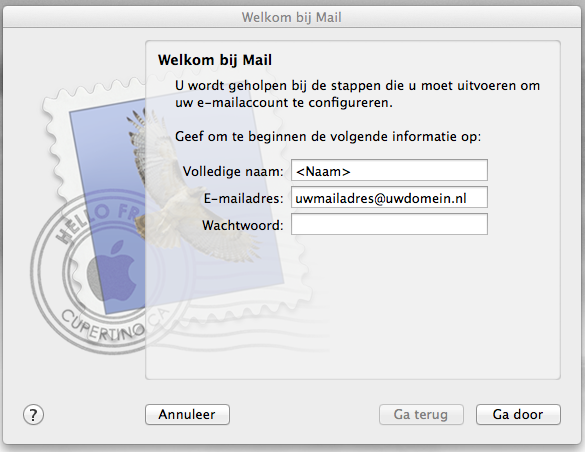
2
Mac Mail - Incoming Mail Server
- Change
Type accountto "Exchange IMAP" - The
Descriptionis optional - At
Server incoming mailandOutlook Web Access-server, enter the name of your 1A-server - Enter your
UsernameandPassword - Click
Continue
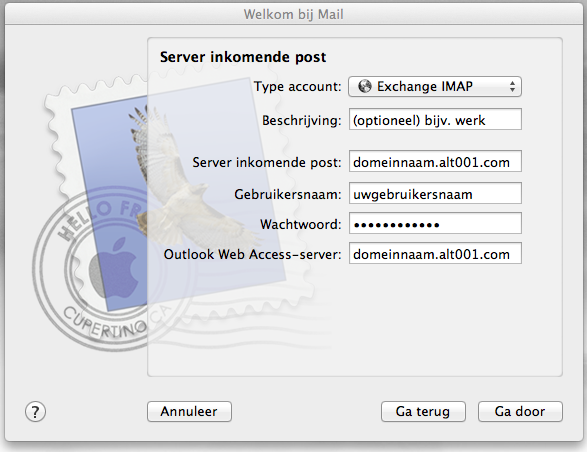
3
Mac Mail - Outgoing Mail Server
- The
Descriptionis optional - At
Server outgoing mail, enter the name of your 1A-server - Check
Use Authentication - If these aren't set yet, enter your
UsernameandPassword - Click
Continue
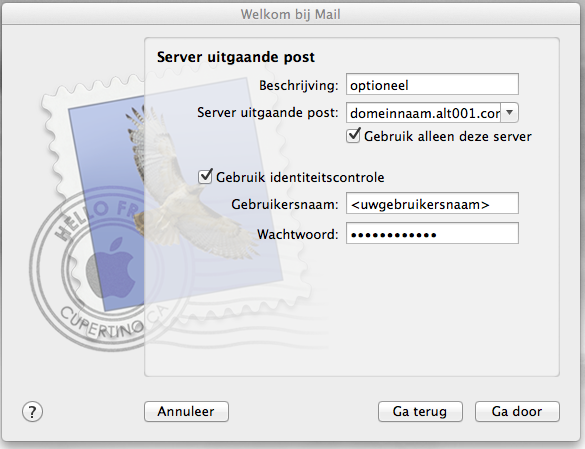
4
Mac Mail - Check settings (1)
- Start the Mail application
- Go to
Mail→Preferences→Advanced - At
Port, enter "993" - Check
Use SSL - Change
Prefix IMAP-pathto "INBOX"
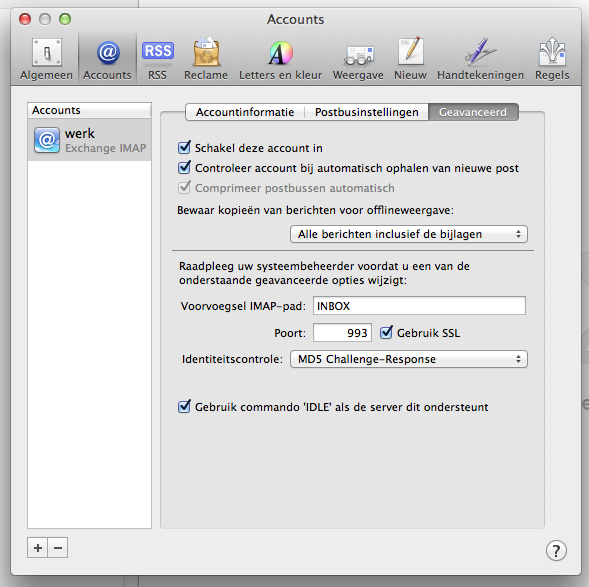
5
Mac Mail - Check settings (2)
- Go to tab
Accountinformation - Click
Outgoing Mail Server (SMTP) - Click
Change SMTP-serverlist... - Choose
Use default ports - Check
Use SSL (Secure Sockets Layer) - Set
Identity verificationto "Password" - Enter your
UsernameandPassword
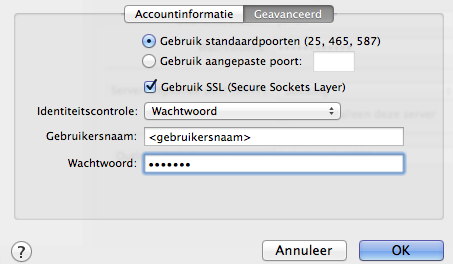
6
Mac Calendar - Find the CalDAV url of the calendar
- Log in to WebAccess or WebApp (the Zarafa webmail client)
- Note the name of the calendar in lowercase and replace whitespaces with '%20'
- Compose the CalDAV url: "https://<servername>:8442/caldav/<username>/<calendar-name>"
Example:https://company.com.alt001.com:8442/caldav/peter/calendarorhttps://company.com.alt001.com:8442/caldav/peter/agenda
Example with whitespaces:https://company.com.alt001.com:8442/caldav/peter/calendar%20with%20whitespaces
7
Mac Calendar - Configuring Mac Ical
- Start the Ical application
- Go to
Ical→Preferences - Go to tab
Accounts - Click on the
+sign to add an account - Select "Add CalDAV Account..."
- Click
Continue
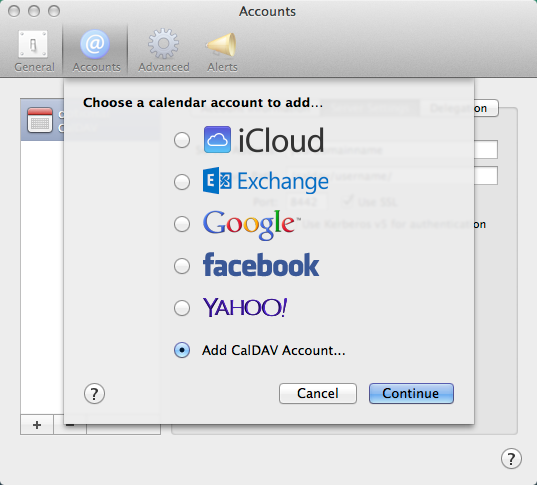
8
Mac Calendar - Add Account
- Change
Type accountto "Manual" - Enter your
UsernameandPassword - At
Serveraddressenter the CalDAV url - Click
Create
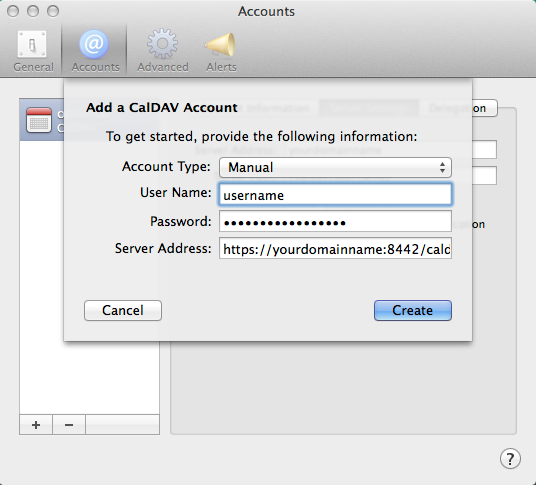
9
Mac Calendar - Verify settings (1)
- Go to tab
Account Information - Verify the settings
- The
Descriptionis optional
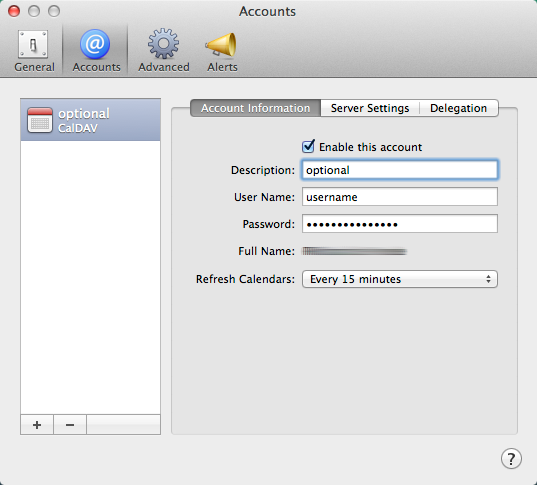
10
Mac Calendar - Verify settings (2)
- Go to tab
Server Settings - Verify the settings
- Close the window
Accounts
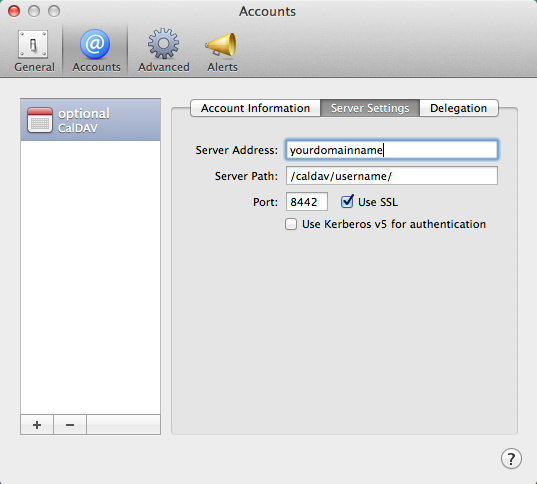
11
Mac Address Book - Finding the CardDAV url
- In your browser, go to "http://<servername>/sabre-zarafa/addressbooks/"
- Log in with your username and password
- Click on your username
- Now you see all your addressbooks. The default addressbook is "Contacts" (or "Contactpersonen" when Zarafa has been configured to use the Dutch language)
- Copy the link of the addressbook you want to add
- Paste the link in an empty text file
- Remove "http://" and append "/"
- The CardDAV url should now look like this: "<servername>/sabre-zarafa/addressbooks/<username>/<addressbook>/"
For example: bokxing.nl.alt001.com/sabre-zarafa/addressbooks/peter/Contacts/
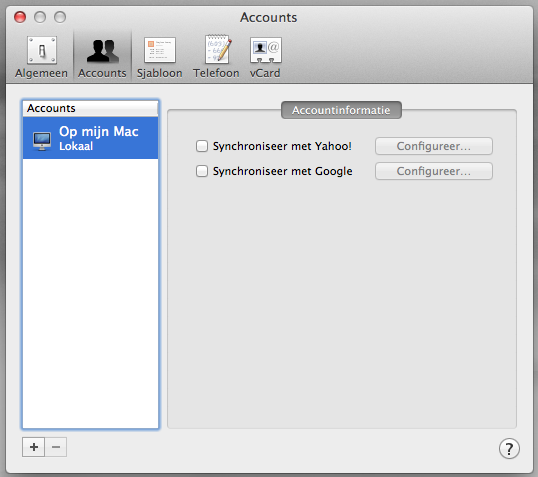
12
Configuring Mac Adresboek
- Open the Addressbook
- Go to tab
Accounts - Click on the
+sign to add an account
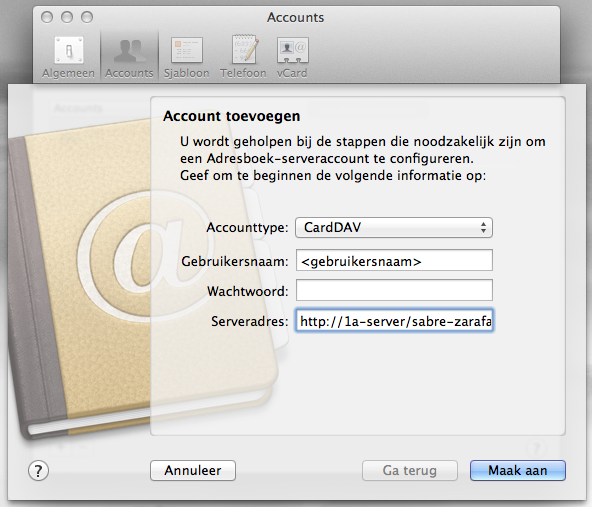
13
Mac Address Book - Add Account
- Change the
Account typeto "CardDAV" - Enter your
UsernameandPassword - At
Serveradresenter the CardDAV url - Click
Create
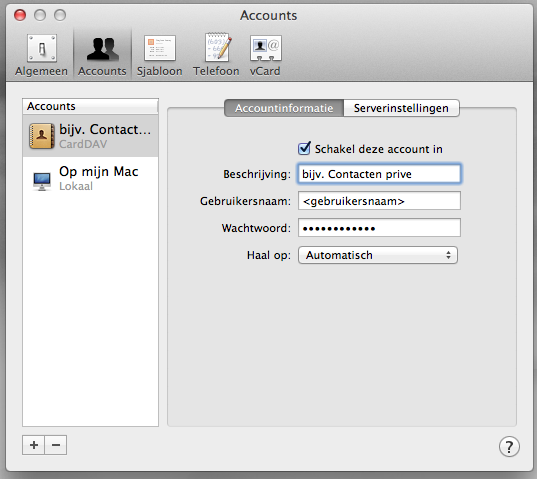
14
Mac Address Book - Verify settings
- Go to tab
Account Information - Verify the settings
- The
Description is optional - Close the window
Accounts
Troubleshooting
1
Mac Calendar - Adding a public calendar
- The CalDAV url is constructed as follows: "https://<servername>:8442/caldav/public/<calendar-name>"
Example: https://company.com.alt001.com:8442/public/our%20public%20calendar
To add a public calendar, follow the steps above.
2
Mac Calendar - Adding a shared calendar
- The CalDAV url is constructed as follows: "https://<servername>:8442/caldav/<username-of-your-collegue>/<calendar-name>"
Example: https://company.com.alt001.com:8442/caldav/john/calendar
To add a shared calendar, follow the steps above.You need access permissions on the calendar you wish to open. This can be done as follows by a Zarafa Admin: - Log in to Zarafa WebAccess
- Go to the calendar
- Right-click on the name of the calendar
- Go to
Properties→ tabPermissions - Click
Add - Select a user
- Grant the appropriate permissions
- Right-click on the inbox of this user
- Go to
Properties→ tabPermissions - Click
Add - Select a user
- Check
Folder visible
